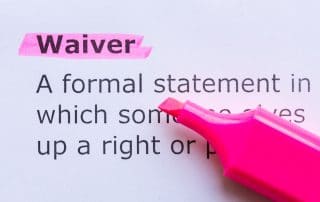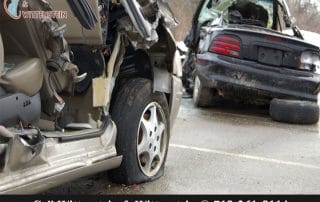NYC Disability Discrimination Attorney

The American Disability Act (ADA) was passed and signed into law in 1990 to protect individuals with disabilities from discrimination across multiple sectors. Since it’s initial passing there have been amendments which broaden the scope of of it’s protection. Although there have been major strides towards a more equitable society for people with disabilities, there is still much work to be done. When an individual is discriminated against due to a disability it negatively impacts society as a whole. In this same vein, one shouldn’t hesitate to contact a NYC disability discrimination attorney if discrimination is suspected. Pursuing a claim today, can help ensure that the discrimination is not perpetuated on another individual in the future.
WHO IS CONSIDERED DISABLED?
Having a medical condition does not automatically deem someone disabled. Rather, an individual with a disability is defined by the ADA as a person who “has a physical or mental impairment that substantially limits one or more major life activities, a person who has a history or record of such an impairment, or a person who is perceived by others as having such an impairment.” Some examples of disabilities include but are not limited to:
- Mobility Impairments (wheelchairs, walkers, etc.)
- Vision Impairment
- HIV positive/AIDS
- Psychiatric Disorders (bipolar disorder, OCD)
- Some types of Cancer
- Epilepsy
- Development Disorders (Autism/ADHD)
Someone who has a condition that is transitory (expecting to last 6 months or less) will not be considered disabled under the ADA. Some examples of conditions that are NOT considered disabilities are:
- Orthopedic Injuries that are expected to heal completely
- Minor and non-chronic gastrointestinal disorders
- Frequent cold and flu
WHAT IS DISABILITY DISCRIMINATION?
Disability discrimination occurs when an entity covered by the ADA treats a disabled individual less favorably than other persons, due to their disability. This also applies to treating an individual less favorably because they have a disabled relative, spouse or friend. For example, denying a mother a job, because she has a son with cancer would be in violation of the ADA. If you believe that you’ve been discriminated against because of a disability, contact NYC disability discrimination attorney Wittenstein & Wittenstein today for a free consultation.
ADA TITLE I: DISABILITY DISCRIMINATION ON THE JOB
State and local governments, employment agencies, labor unions, agents of the employer and joint management labor committees and private companies with 15 or more employees, are required to abide by the provisions set forth under Title I of the ADA. These entities cannot discriminate when it comes to hiring, firing, giving out raises/promotions, benefits, leave of absences and all other employment matters. Title I of the ADA protects qualified disabled individuals from employment discrimination. A qualified individual is someone who despite the disability, is able to perform all tasks required of the job.
Before You Get Hired
In the past when you’ve applied for a job, you may have seen prospective employees ask about any disabilities you may have. Employers are permitted to ask about a disability when it is required under other federal regulations such as is the case with veterans with disabilities. Employers may also ask about your disability if they’re doing so to more readily be prepared to accommodate for individuals with disabilities. Otherwise, employers are not allowed to ‘screen’ for disabilities, nor ask about the nature or duration of a disability. They are also not permitted to require that a candidate take an aptitude or medical test, unless all other employees are also required to take it.
Once You’re Hired
An employer is required to make accomodations for an individual as long as it won’t result in undue hardship to the business/employer. For the accommodations to be made, the employer must be informed of the disability and the person requesting the accommodations must otherwise be qualified. Some examples of changes an employer may make to accommodate individuals are:
- Having ramps installed for those in need of a wheelchair
- Having sign language interpreters available for deaf employees
- Modifying a work schedule
If you believe that you have been discriminated against at work due to your disability, call Wittenstein & Wittenstein today. Proving you were discriminated against and filing a charge through the Equal Employment Opportunity Commission may prove to be an arduous task. Having an attorney in your corner to guide you through all the steps of the process will help ensure that you get the representation you deserve.
ADA TITLE II: STATE AND LOCAL AGENCIES
Under Title II of the ADA, programs, activities and services sponsored by state and local governments are required to be accessible to people with disabilities. This includes, but is not limited to public education, transportation, town meetings, social services and health care. State and local governments are not required to change the accessibility if it will result in undue financial hardship or if it will have to be adjusted in such a way that it will significantly diminish the nature or purpose of the original program.
Title II of the ADA also covers accessibility when it comes to public transportation. You may notice that MTA busses are wheelchair accessible, have priority seating in the front, and announce stops. These are all examples of efforts to be accessible to people with disabilities. Private transportation companies providing services to the public also must be accessible. This includes airport shuttles, hotel shuttles and Over the Road Bus Companies (ORBC) such as Greyhound. Private taxis and for-hired-vehicles are not required to be wheelchair accessible, but drivers in New York City are required to take a Wheelchair Accessible Vehicle (WAV) class prior to obtaining a Taxi & Limousine Commission (TLC) license. In addition taxi & livery drivers cannot deny a passenger service because they have a service animal nor can they arbitrarily charge an individual a higher fare because they need extra time or help to put away mobility devices.
ADA TITLE III: PUBLIC ACCOMMODATIONS
Title III covers disability discrimination as it applies to public accommodations. Public accommodations applies to businesses that are privately owned. If a business is privately owned and has services opened to the public, they must follow architectural and construction regulations that allow access to people with disabilities. Examples of such businesses are movie theaters, restaurants, bars, and amusement parks.
ADA TITLE IV: TELECOMMUNICATIONS
Title IV of the ADA pertains to internet and telephone companies. It requires that these companies provide a system of telecommunication relay services so that people with hearing and/or speech impediments can communicate over the phone. Telephone and internet companies must provide this nationally allowing communication between states and within states. This title also requires that closed captioning be available for any federal funded public service announcements.
In 2010, President Obama signed into law the Twenty-First Century Communications and Video Accessibility Act (CVAA). The CVAA ensures that the accessibility laws enacted in the 1990’s are brought up-to-date with modern technology.
CONTACT A NYC DISABILITY DISCRIMINATION ATTORNEY TODAY
Disability discrimination has far reaching impacts if not dealt with. If you believe you were discriminated against because of your disability, contact a NYC disability discrimination attorney today. Call Wittenstein & Wittenstein for a free consultation.






